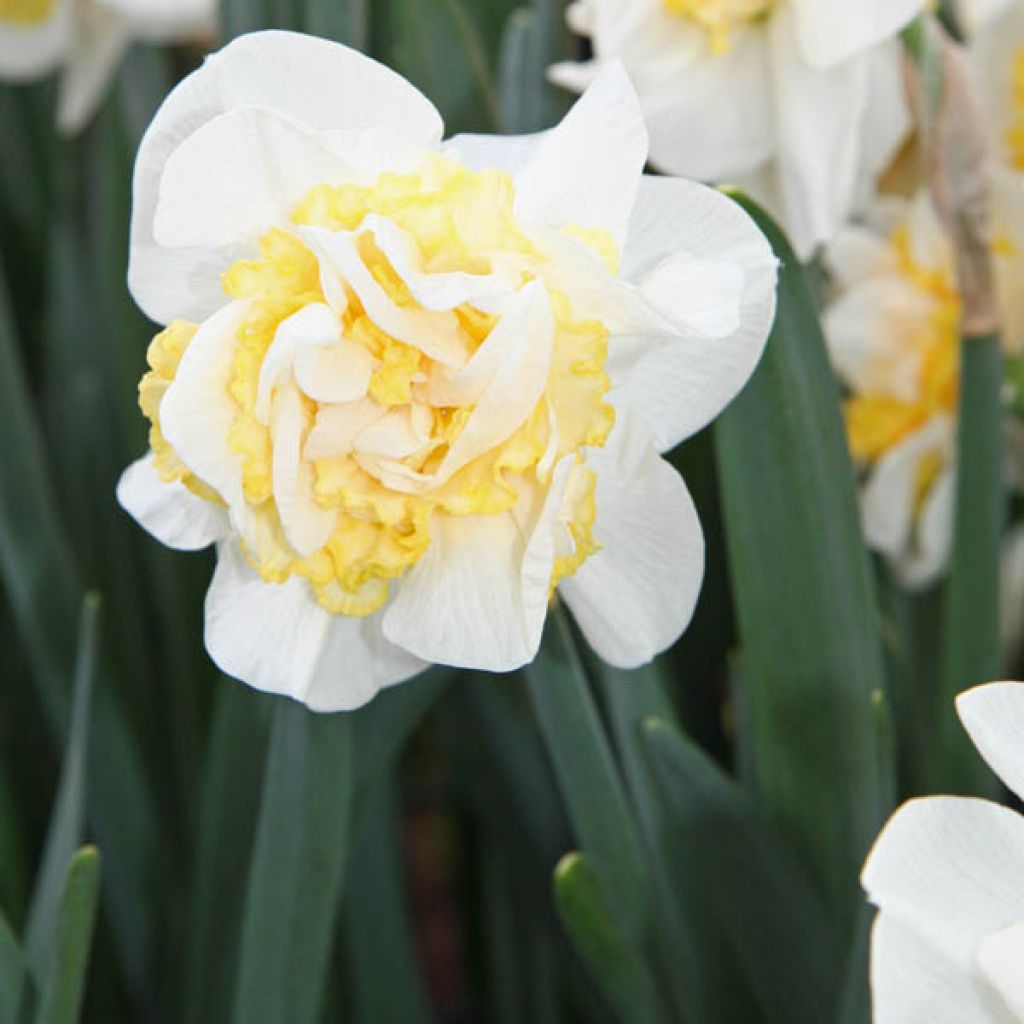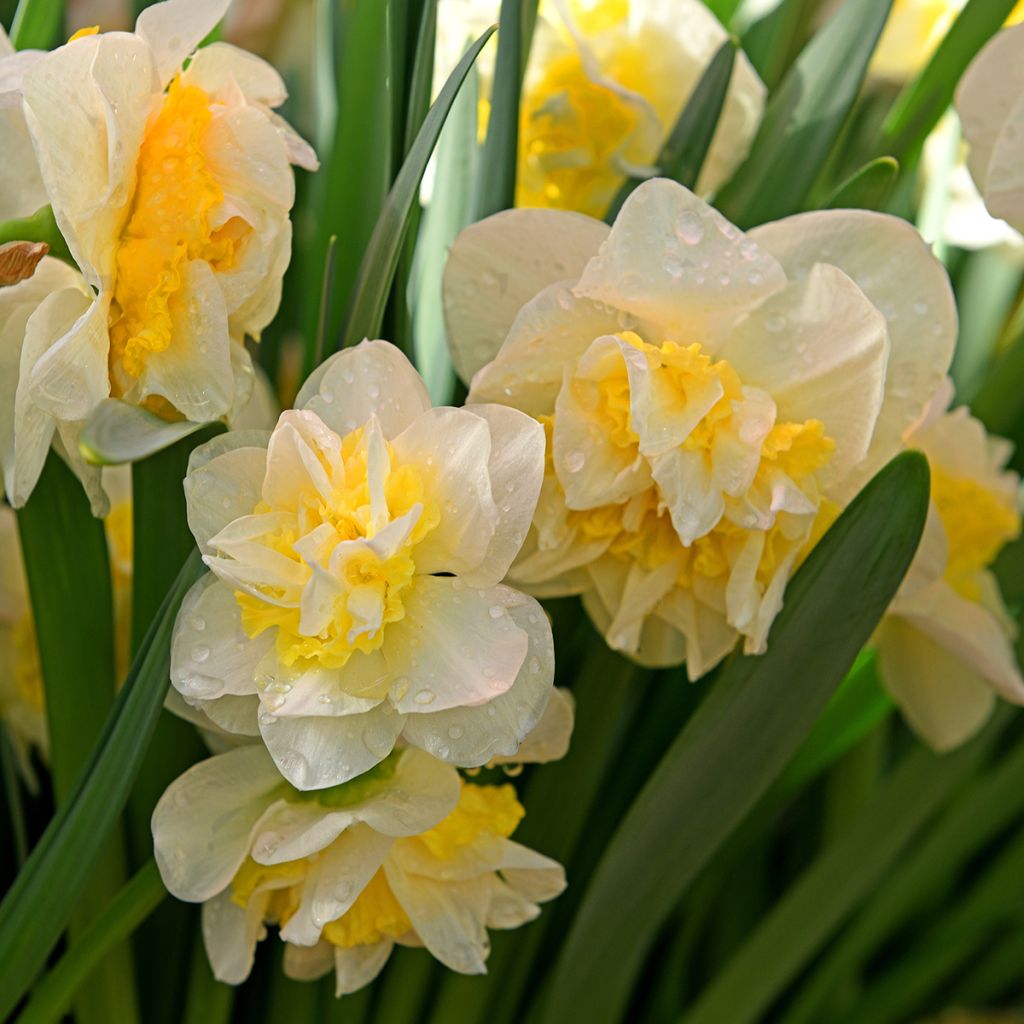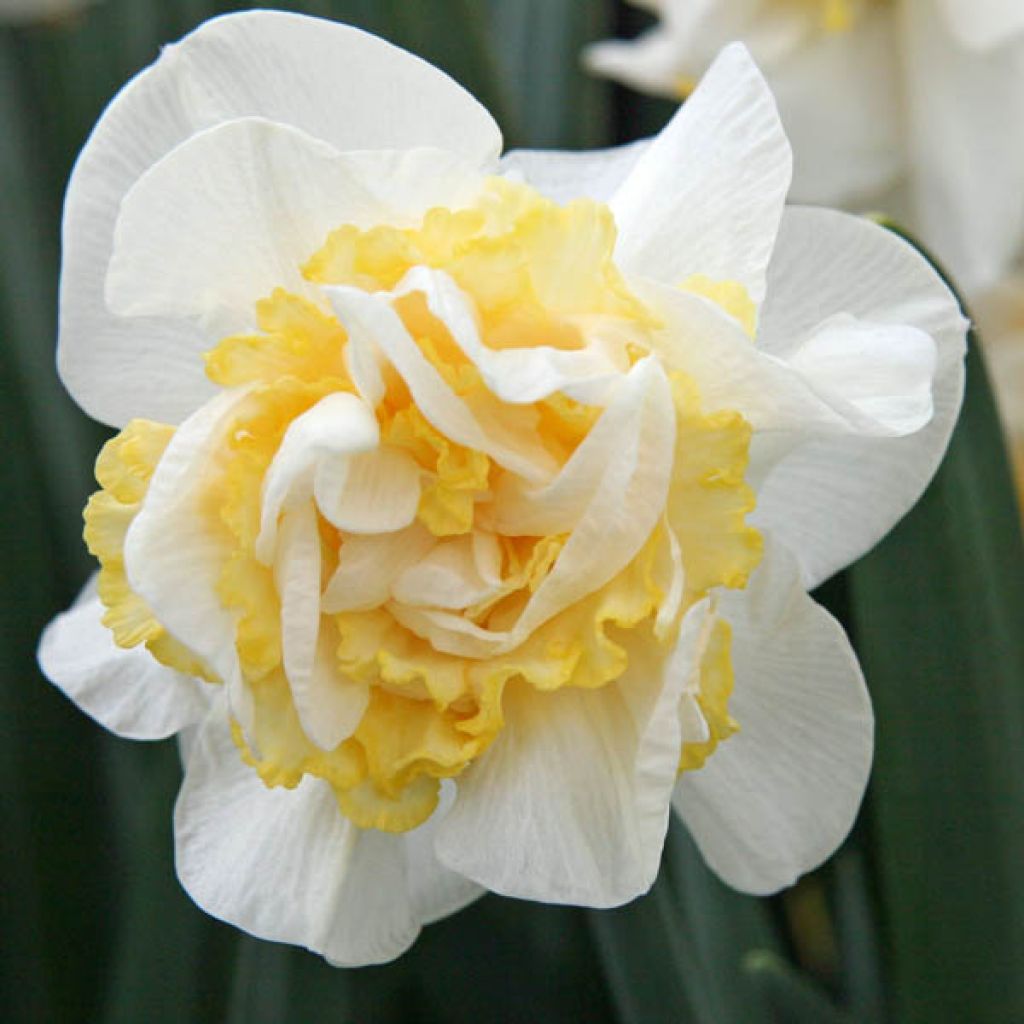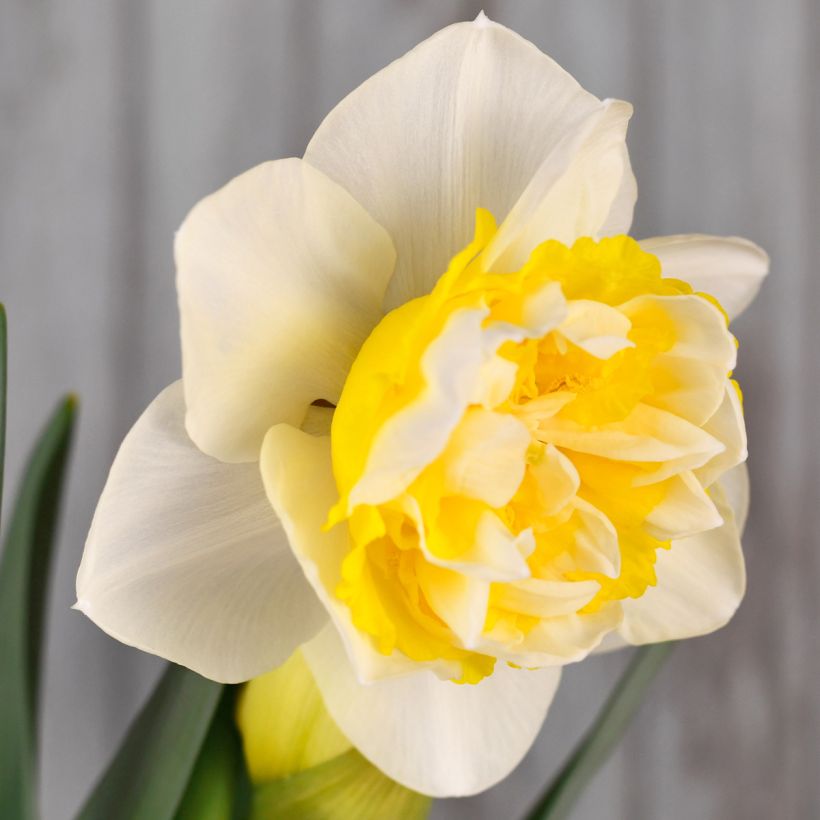

Narcisse Westward


Narcisse Westward


Narcisse Westward
Narcissus Westward
Narcissus Westward
Daffodil, Narcissus, Jonquil
This plant carries a 6 months recovery warranty
More information
We guarantee the quality of our plants for a full growing cycle, and will replace at our expense any plant that fails to recover under normal climatic and planting conditions.
From €5.90 for pickup delivery and €6.90 for home delivery
Express home delivery from €8.90.
Delivery to Corse prohibited: UE law prohibits the import of this plant from mainland France to Corse as part of the fight against Xylella fastidiosa. Please accept our sincere apologies.
More information

Does this plant fit my garden?
Set up your Plantfit profile →
Description
Narcissus Westward is a beautiful novelty, with a large solitary double flower on each stem, with a white corolla topped with a heart of crumpled petals, delicately mixed with yellow gold. It blooms in April-May, at the end of the narcissus season. This small variety is a remarkable cut flower and an easy-to-grow plant, hardy, vibrant and elegant.
The 'Westward' double-flowered Narcissus belongs to the lily family (Amaryllidaceae), specifically to division 4 of the large narcissus family, which comprises 12 divisions. The Narcissus genus includes about 50 species found mainly in the western Mediterranean, but also in Africa and Asia. 'Westward' is a low-growing variety that produces a very sturdy 30 cm (12in) tall flowering stem. It is a mid-late bloomer, in April-May, with a large yellow-green floral bud that opens into a magnificent flower composed of a heart of crumpled white and yellow gold petals, intertwined with each other, on a corolla of large ivory-white petals. Double-flowered narcissi have an extra crown of petals and a long flowering period. The flowers have six petal-like tepals. The six stamens are inserted into a cup-shaped crown or paracorolla. The deciduous, linear foliage disappears in summer.
With so many narcissus varieties available, one can enjoy them for three months in spring without ever getting tired. They all naturalise easily and love yellow and white, and often they have a sweet fragrance. These are all reasons to grow them in large clumps (at least 20 bulbs) for a mass effect. Combine 'Westward' in slightly formal flowerbeds, with scilla and hyacinths or plant them with double tulips, forget-me-nots, pansies, or liverworts. A bunch of 'Westward' double-flowered narcissus in a vase will look sensational. This narcissus is perfect for containers.
Daffodils and narcissus are the same and this variety belongs to division 7 of the group. Native to southern Europe and North Africa, they have flowers grouped in twos or more. Botanical species have retained the charm of wild plants and thrive in rock gardens: N.bulbocodium, N. canaliculatus, N.juncifolius, N.pseudonarcissus, and the simple wood jonquil are among the prettiest. For bouquets, we advise against mixing them with other flowers such as tulips, as the stems of narcissus contain a substance that causes other flowers to wilt quickly. This detrimental effect on other flower types can be mitigated by dipping the ends of narcissus stems in warm water for 1 to 2 minutes.
Report an error about the product description
Narcissus Westward in pictures


Plant habit
Flowering
Foliage
Botanical data
Narcissus
Westward
Amaryllidaceae
Daffodil, Narcissus, Jonquil
Cultivar or hybrid
Planting and care
Narcissi bloom from March to May and come back every year. They are easy to grow and thrive both in the shade of the undergrowth and in a sunny flower bed. Plant them 10 cm (4in) deep and 10 cm (4in) apart in sets of at least 5 bulbs, in uniform or mixed colours. To plant them in a lawn: lift a patch of turf, dig and loosen the soil to a depth of at least 20 cm (8in) (the height of a spade), place your bulbs, cover with soil and replace the turf. Choose a spot where you won't mow, as you must let narcissus leaves wither before cutting them. This is when the bulb regenerates and prepares the flowers for the following year. However, remove the flowers as soon as they fade to prevent seed formation which would unnecessarily deplete the bulb.
Planting period
Intended location
Care
-
, onOrder confirmed
Reply from on Promesse de fleurs
Haven't found what you were looking for?
Hardiness is the lowest winter temperature a plant can endure without suffering serious damage or even dying. However, hardiness is affected by location (a sheltered area, such as a patio), protection (winter cover) and soil type (hardiness is improved by well-drained soil).

Photo Sharing Terms & Conditions
In order to encourage gardeners to interact and share their experiences, Promesse de fleurs offers various media enabling content to be uploaded onto its Site - in particular via the ‘Photo sharing’ module.
The User agrees to refrain from:
- Posting any content that is illegal, prejudicial, insulting, racist, inciteful to hatred, revisionist, contrary to public decency, that infringes on privacy or on the privacy rights of third parties, in particular the publicity rights of persons and goods, intellectual property rights, or the right to privacy.
- Submitting content on behalf of a third party;
- Impersonate the identity of a third party and/or publish any personal information about a third party;
In general, the User undertakes to refrain from any unethical behaviour.
All Content (in particular text, comments, files, images, photos, videos, creative works, etc.), which may be subject to property or intellectual property rights, image or other private rights, shall remain the property of the User, subject to the limited rights granted by the terms of the licence granted by Promesse de fleurs as stated below. Users are at liberty to publish or not to publish such Content on the Site, notably via the ‘Photo Sharing’ facility, and accept that this Content shall be made public and freely accessible, notably on the Internet.
Users further acknowledge, undertake to have ,and guarantee that they hold all necessary rights and permissions to publish such material on the Site, in particular with regard to the legislation in force pertaining to any privacy, property, intellectual property, image, or contractual rights, or rights of any other nature. By publishing such Content on the Site, Users acknowledge accepting full liability as publishers of the Content within the meaning of the law, and grant Promesse de fleurs, free of charge, an inclusive, worldwide licence for the said Content for the entire duration of its publication, including all reproduction, representation, up/downloading, displaying, performing, transmission, and storage rights.
Users also grant permission for their name to be linked to the Content and accept that this link may not always be made available.
By engaging in posting material, Users consent to their Content becoming automatically accessible on the Internet, in particular on other sites and/or blogs and/or web pages of the Promesse de fleurs site, including in particular social pages and the Promesse de fleurs catalogue.
Users may secure the removal of entrusted content free of charge by issuing a simple request via our contact form.
The flowering period indicated on our website applies to countries and regions located in USDA zone 8 (France, the United Kingdom, Ireland, the Netherlands, etc.)
It will vary according to where you live:
- In zones 9 to 10 (Italy, Spain, Greece, etc.), flowering will occur about 2 to 4 weeks earlier.
- In zones 6 to 7 (Germany, Poland, Slovenia, and lower mountainous regions), flowering will be delayed by 2 to 3 weeks.
- In zone 5 (Central Europe, Scandinavia), blooming will be delayed by 3 to 5 weeks.
In temperate climates, pruning of spring-flowering shrubs (forsythia, spireas, etc.) should be done just after flowering.
Pruning of summer-flowering shrubs (Indian Lilac, Perovskia, etc.) can be done in winter or spring.
In cold regions as well as with frost-sensitive plants, avoid pruning too early when severe frosts may still occur.
The planting period indicated on our website applies to countries and regions located in USDA zone 8 (France, United Kingdom, Ireland, Netherlands).
It will vary according to where you live:
- In Mediterranean zones (Marseille, Madrid, Milan, etc.), autumn and winter are the best planting periods.
- In continental zones (Strasbourg, Munich, Vienna, etc.), delay planting by 2 to 3 weeks in spring and bring it forward by 2 to 4 weeks in autumn.
- In mountainous regions (the Alps, Pyrenees, Carpathians, etc.), it is best to plant in late spring (May-June) or late summer (August-September).
The harvesting period indicated on our website applies to countries and regions in USDA zone 8 (France, England, Ireland, the Netherlands).
In colder areas (Scandinavia, Poland, Austria...) fruit and vegetable harvests are likely to be delayed by 3-4 weeks.
In warmer areas (Italy, Spain, Greece, etc.), harvesting will probably take place earlier, depending on weather conditions.
The sowing periods indicated on our website apply to countries and regions within USDA Zone 8 (France, UK, Ireland, Netherlands).
In colder areas (Scandinavia, Poland, Austria...), delay any outdoor sowing by 3-4 weeks, or sow under glass.
In warmer climes (Italy, Spain, Greece, etc.), bring outdoor sowing forward by a few weeks.



































